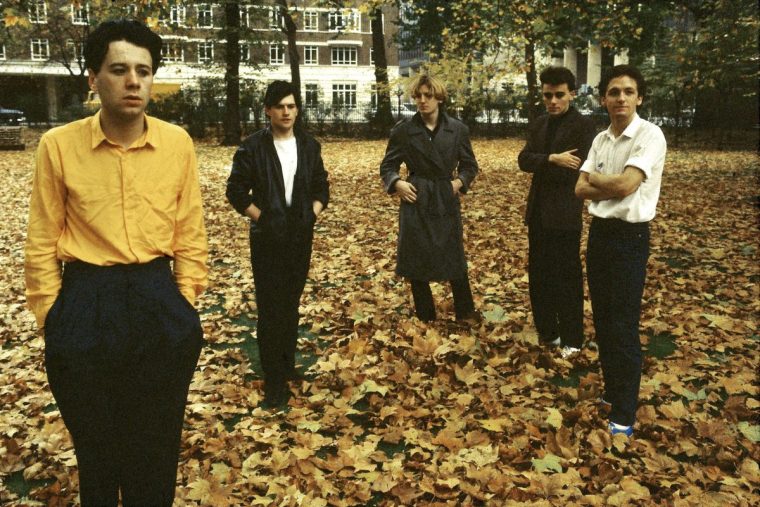One morning last week, an hour or so before I spoke to Jim Kerr and Charlie Burchill over video call, a 44-year-old track by their band – 80s phenomenon Simple Minds – played on Nick Grimshaw’s 6 Music breakfast show. Sandwiched between The Chemical Brothers and Nirvana on one side, Sports Team and The Dare on the other, “Love Song” blasted in from more than four decades ago, sounding entirely at home and entirely now on Grimshaw’s uplifting, seize-the-day “Cloudbusting” playlist. Icy yet red-hot, precision-tooled but raw, powerful and propulsive, this was an electroshock catalysing a brighter day all the way from 1981.
Back then, “Love Song” was the Glasgow band’s biggest “hit” yet, reaching number 47 in the charts. They’d already been going for four years – their Euro-facing art-synth-rock bringing them a kind of cult cool – but within six months of this breakthrough track, the proper chart tunes started coming, year on year: “Promised You a Miracle”, “Glittering Prize”, “Waterfront”, “Speed Your Love to Me”, “Up on the Catwalk”. Then, in 1985, the biggest of them all: “Don’t You (Forget About Me)”, their era-defining American number one, taken from the soundtrack to The Breakfast Club.
Over 40 years on from a single that elevated Simple Minds to the rarefied heights also occupied by U2 – fellow Celtic practitioners of what was known then (sometimes sniffily) as The Big Music (that is, widescreen, epic, often overly earnest rock) – Kerr and Burchill have written their joint memoir, Our Secrets Are the Same. Created with music journalist Graeme Thomson, it follows the band and their lifelong friendship, one formed in the high-rise flats and low-income streets of 70s Glasgow.

Each of them, the founding duo who’ve stayed steadfast amid a revolving door of musicians, contributes their recollections. Lyricist Kerr, ever the charismatic frontman, is the voluble, assiduous chronicler of the many highs – that US chart-topper from John Hughes’s beloved film, Live Aid, 1988’s Nelson Mandela 70th Birthday Tribute Concert at Wembley – and not-infrequent lows: “I understood the criticisms we faced about selling out… In striving to appeal to everyone, it’s easy to appear overblown and just too much.”
Multi-instrumentalist Burchill is the staunch wingman, happily toiling in the background, occasionally wishing his ever-ambitious childhood pal would cool his jets just a bit. “At times, I think, ‘I’m going to drug him. I’m going to put something in his drink,’” Burchill writes. “It was perhaps too much for some former band members.”
“He’s absolutely kept me on my toes – even from before we were in a band,” says 65-year-old Burchill now, with a grin. He’s talking from his studio (“Well, a man-hut with a few keyboards and guitars”) at his partner’s home in the south of Holland. “When I’d had a guitar for about a week, Jim was already telling people I was the best player in Glasgow. But that’s Jim. He is relentless, which is brilliant. We would never have got to where we are without that.”
In the endlessly vivid book, this insight extends to blunt pragmatism about the up-and-down fortunes of their band. As the 80s turned into the 90s, Kerr writes how he “could see the new tribes coming over the hill”, meaning the younger, fresher bands (Happy Mondays, Stone Roses, the Britpop hordes) who were rendering Simple Minds less and less relevant. Even with the insulation of 60 million album sales, he admits now that was “very difficult”.

“The stoic side was, well, no one said it’s meant to go on for ever. I think of the generation of bands before us that lost it overnight when punk came around. For a lot of our heroes – Alex Harvey, Steve Harley, Thin Lizzy – it was ‘see you later’ overnight,” says 66-year-old Kerr, over video call from his partner’s home in the south of France.
“The other thing was, we were running on fumes. It’d be different if you felt you were doing your greatest stuff ever but, by that time, we were almost 20 years down the track. The well isn’t [bottomless].” But they were more than secure financially and, equally, were determined not to be “one of those bands who think the world owes them something. ‘Aw, they don’t play my record anymore. They’ll no’ f**king write about me anymore.’ You feel pathetic for them.”
That no-nonsense, obsessive nature may have, in part, cost Kerr two marriages (to Pretenders’ frontwoman Chrissie Hynde and actor Patsy Kensit). It hasn’t, remarkably, cost him his sanity. After all, this is a band who’ve been on the go, without ever splitting, for almost half a century. Despite a dip in their fortunes around the turn of the millennium, with musical nostalgia now the hottest ticket in town, Simple Minds are once again an arena-level band.
Kerr remains in a childlike thrall to “the calling” that led him and Burchill to form Simple Minds in the Glasgow greyness of post-punk. “Back then, especially in our peak days, no one was aware of mental health and how you were coping – or weren’t,” Kerr says. “It was a bit like, ‘Hey, you dreamed about this all your life, son, you better get on with it.’ There was that stoicism, which is now frowned upon… But I don’t think every [musician] is cut out for being in a band that length of time. They’re maybe cut out for rehearsing and playing and recording. But all the other stuff that goes with it: no.”

There was never more of “the other stuff” than in 1985. In the year of Simple Minds’ biggest success (that year’s seventh album Once Upon A Time is their biggest seller), and of Live Aid, he and first wife Hynde had a baby. Leading up to that, Simple Minds had kept “growing and growing and growing”, and Kerr can now recognise his hubris.
“Perhaps, I was starting to think, ‘Ten nights at the Hammersmith Odeon? A doddle. Gold discs, America beckoning? All great, but a doddle.’ So one of the great things about meeting Chrissie was, ‘I might have bitten off more than I can chew here.’ That really appealed – in theory!” he says, laughing. But the success of “Don’t You (Forget About Me)” helped precipitate the demise of their marriage. “You’re away on tour for 10 months, then when that tour finishes, [The Pretenders’] tour starts. You’re full of idealism [at first] – love will conquer and all that. But it was overwhelming.” By 1990, he and Hyde were divorced.
His 1992 marriage to Kensit, after a whirlwind nine months, brought a different kind of overwhelming – and a world that very much wasn’t Kerr’s, a swirl of parties and Hollywood-adjacent glitz that he hated.
The year after he and Kensit’s 1996 divorce, she married Liam Gallagher, which made the Oasis frontman stepfather to Kerr’s son, James. A doting daddy figure, Liam wrote “Little James” about him, his first composition on an Oasis album (2000’s Standing on the Shoulder of Giants). “When Liam was around and I wasn’t, I’d say to James, with some trepidation, because I’d [read about him], ‘How’s Liam?’ And kids tell you the truth. ‘He’s great, Dad!’ People wonder, didn’t that make me jealous? No, it made me think: he’s safe.”
To sense-check his own memories, Kerr recently asked James again, now 33 and working in the music industry. “He said, ‘No, Liam was f**king great. It was like having a big brother, like having another big kid around.’”
Simple Minds, meanwhile, always have each other around. Such is the depth of Kerr and Burchill’s lifelong bromance that they are now neighbours in Taormina, Sicily. As their book would have it, these two have barely even had a major fall-out, other than a brief beef about a setlist after a gig at London’s O2 in 2015.
That, insists Burchill, is true because, while their secrets might be the same, their personalities aren’t. “We’re chalk and cheese,” says the guitarist. “There’s always something to be learned from the other one’s perspective. Whereas if we were two alpha males who disagreed, you could see that becoming a problem.”
Ask Kerr to explain how they’ve maintained a friendship, a partnership, a co-habitation even – Burchill is currently living in Kerr’s “spare” apartment in Taormina while his own place is renovated – and he frames it simply, yet deeply.
“It’s never, ever been boring. That’s because, even if you put to the side the fact that Charlie’s so likeable, there’s an incredible alikeness in terms of what we like outside of music, books, literature. The fact that we both are Italophiles. And what are the chances we support the same football team?” he jokes of their shared passion for Celtic. “Yet at the same time, we are very different. He keeps different hours from me. He can tell you the history of every whisky bottle. I’m not a drinker.”
Ultimately, he cites something Burchill mentions in the book: Kerr is the eldest boy in his family, Burchill the youngest in his. “So we’re shaped, definitely, there.”
‘Our Secrets are the Same’ (Constable, £25) is out now. The 40th anniversary edition of ‘Once Upon A Time’ is released on 17 October
